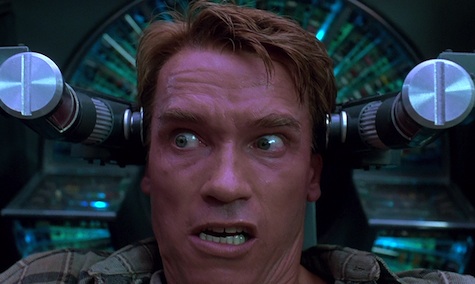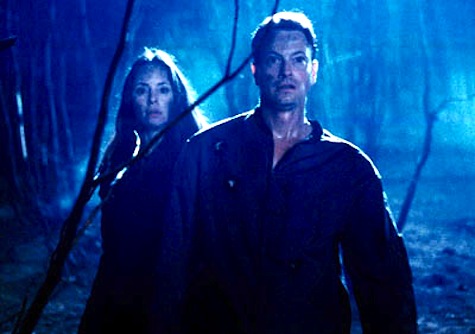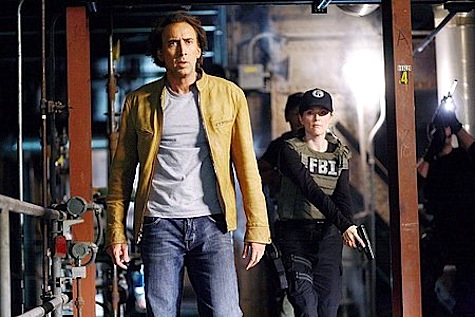Friday will see the release of a new Total Recall, which aims to erase our memories of another movie called Total Recall. Do films remember other films wholesale? Or do films dream of electric films? In either case, it remains to be seen if Total Recall is a cinematic imposter of a Philip K. Dick story or is instead just the second variety of a well-worn 90’s action movie.
In the meantime, join me as I turn my scanner, darkly, toward all of the films made from Philip K. Dick’s work and try to figure out which of them are quality movies and which actually have something in common with the source material. I’ll give each movie two letter grades: one for being a good or bad movie and one for being faithful to the source material. (Note: faithful doesn’t always mean just following the plot, but capturing the themes and essence as well.)
Blade Runner based on the novel Do Androids Dream of Electric Sheep?
Movie Grade: A+
Faithfulness to Source Material: D+
The most famous Philip K. Dick adaptation is also widely considered to be the one of the best science fiction films ever made. Talking about why this movie is so damn awesome isn’t what this is all about right now, but let’s just say that it deserves all the praise it gets—but the movie and the novel are extremely different. In the original text, the replicants are called “andys,” or servant androids. Richard Deckard is married and wants to own a real, live sheep (an ewe, to be exact). Owning real animals is a huge status symbol in the novel, a notion that barely surfaces in the film. Further, Deckard himself isn’t the depressed noir gumshoe we see in the film. He’s actually trying to better himself and move up the career ladder at his job. That’s a far cry from Harrison Ford being called back to duty in the film.
If a huge fan of SF and Philip K. Dick had somehow never read Do Androids Dream of Electric Sheep? and had never seen Blade Runner, I might blasphemously suggest they could skip the novel and just watch the movie. There are a lot of other Dick novels and stories, which are actually more cohesive and much better.
Screamers, based on the short story “Second Variety“

Movie Grade: D
Faithfulness to Source Material: C
Allegedly, Screamers has a cult following, though I’m not really sure why. The writer of the screenplay is a guy named Dan O’Bannon who is responsible for penning a host of other SF films including Dark Star, Alien, Lifeforce, Alien vs. Predator and notably, for adapting another Dick story, Total Recall. It’s not that Screamers is bad per se, it’s just that I don’t understand why anyone would like it. It’s also not really about what the story is about. Sure, the same basic premise of non-humans among us (“screamers”) is dealt with in a post- apocalyptic setting. However, the story takes place in what used to be France while this movie takes place on another planet. As with Imposter later, there’s only so many different ways to do robot paranoia in a movie without the concept getting stale. Movies like Imposter and Screamers don’t do a lot for Dick’s central thematic questioning of our own humanity through non-humans. It’s almost as though the re-imagined Battlestar Galactica understood PKD better than some actual Dick movies.
Total Recall, based on the short story “We Can Remember It For You Wholesale“

Movie Grade: B-
Faithfulness to Source Material: B
No one is rushing to give director Paul Verhoeven any medals for artsy subtlety. From Robocop, to Starship Troopers, to Showgirls, the name of the game is sex or violence and preferably both. We could think of Paul Verhoeven as the X-Rated Michael Bay, but that would be paying Michael Bay a compliment. As with his other movies, there is something to Total Recall. Is it a big dumb sci-fi action movie? Yes. Do you feel terrible watching it? No. As far as the source material goes, the biggest problem here is that in the short story Quail/Quaid never actually goes to Mars, but instead wants the memory of visiting Mars implanted in his mind. The story focuses more on the problem of trying to implant a false memory, but then that memory turns out to be real. It also serves up a nice twist which is lacking from the film. But Total Recall is in no way offensive to the short story. Instead, it’s exactly what it should be: “We Can Remember It For You Wholesale” + more guns and sex.
Confessions d‘un Barjo, based on the novel Confessions of a Crap Artist
Movie Grade: C-
Faithfulness to Source Material: C+
Imagine Philip K. Dick reinventing himself as a kind of mash-up between Charles Bukowski and John Updike: this novel would be the result. A literary non-science fiction novel, Confessions of a Crap Artist depicts the woes of suburban living. The action, such as it is, takes place primarily in San Diego in the novel, but in the movie it’s transported to France! Neither the film nor the novel are particularly memorable, but naturally the changing of the culture and the setting from the novel does alter what the source material is all about.
Imposter, based on the short story “Imposter“

Movie Grade: C
Faithfulness to Source Material: B
Both the story and the film suffer from the same problem: Philip K. Dick did better things with these same ideas and themes in other places. The notion that a man who is accused of being a replicant (and who is indeed a replicant and therefore a tragic figure) is explored better in Do Androids Dream of Electric Sheep? and elsewhere. Further, the film Blade Runner more subtly teases robot-or-not-robot dilemmas whereas the ham-handed Imposter makes all of its themes as obvious and predictable as its plot.
But it’s not all bad. Gary Sinise is pretty great in this movie, and it’s exciting enough to watch at times. Most interestingly, though, is that it’s not super inaccurate when it comes to the short story. In a lot of ways, it’s pretty much the same story. Certainly, in comparison with other Philip K. Dick adaptions, Imposter, in terms of faithfulness, can elicit a somber “close enough.”
Minority Report, based on the short story “The Minority Report“

Movie Grade: A
Faithfulness to Source Material: C
One of Spielberg’s more robust movies, everything about Minority Report moves, is exciting and relies on its science fictional aspects to push the story forward. It also has pretty much nothing in common with the short story. John Anderton in the film is an in-shape Tom Cruise with six pack abs. But in the story, he’s overweight and a little older. As in Do Androids Dream of Electric Sheep? the main character in Dick’s original version is married, but single/divorced in the movie.
The list goes on and on. Anderton of the film shuts down PreCrime; in the story, he prevents his closure. The origins of the Precogs are different (and much harsher in the story!) and the nature of the conspiracy around Anderton has totally different motivations. Unlike Do Androids Dream of Electric of Electric Sheep? vs. Blade Runner, however, the spirit of this movie feels like it’s in the same family as the short story.
Paycheck, based on the short story “Paycheck“
Movie Grade: D-
Faithfulness to Source Material: D-
Elegance is the main strength of this famous Dick story. After doing a job, which requires his memory to be wiped after the job’s completion, a man named Jennings finds himself on the run from the secret police. His promised paycheck isn’t there; he finds that he supposedly chose a bag of random stuff in payment, instead. The bag of random stuff of course proves to be really handy, and Jennings later realizes that there is a time-traveling version of himself helping him out. In contrast, the film is overly complicated, relies to heavily on action, and is just plain awful. It’s a bad movie based on an awesome story and you shouldn’t waste any amount of your paycheck on it. (I’m sure this joke was made a lot in 2003 when the movie came out.) Notably, John Woo has not made an American film since this movie released.
A Scanner Darkly, based on the novel A Scanner Darkly

Movie Grade: A-
Faithfulness to Source Material: B+
Despite what you may have heard, I find the Richard Linklater film to be a fantastic interpretation of this particular Dick novel. The rotoscoping-animated style of this film seems like it would also be perfectly suited to the surreal musings of Dick’s non-fiction (particulary his Exegesis, should there be a future adaptation). In this case, both the film and novel are science fiction stories about real drug addiction. I find both to be highly compelling, and the competence of the performances and the style of the movie make up for changes made from the source material. This is the “arty” Philip K. Dick movie and it’s totally watchable and fantastic. Also, Robert Downey, Jr., Woody Harrelson and Winona Ryder are all at their best in this moive. Possibly the best adaptation of Dick’s work, if not the best overall movie.
Next, based on the novelette “The Golden Man“

Movie Grade: D
Faithfulness to Source Material: F
I tend toward an unabashed, knee-jerk defense of bad movies with Nicolas Cage in the leading role, but this one can’t possibly be defended. A classic early Philip K. Dick story is completely gutted by a terrible mish-mash of a movie that was apparently made worse in rewrite hell. The story deals with a mutant named Cris who can see the future. He’s got golden skin, hence “The Golden Man.” In the movie he’s just Nicolas Cage, which I guess is our current society’s equivalent of a mutant. Talking about the “plot” of Next is hardly worth anyone’s time, but the biggest problems lie with Cris actually helping the government and fighting terrorism. While there’s nothing wrong with helping the government to fight terrorists, it’s not something Philip K. Dick was writing about and to have his name on this one in particular is pretty awful.
The Adjustment Bureau, based on the short story “The Adjustment Team“
Movie Grade: B+
Faithfulness to Source Material: B-
Though time may end up being unkind to this movie, I have a soft spot for it. The production design tends toward a future-noir sensibility, which makes an audience member, perhaps unwittingly, think of Philip K. Dick. If Jonathan Lethem’s Gun, With Occasion Music were ever adapted into a movie, I see it looking something like this. The actors are all decent and plot (though wildly different from the story) moves along smoothly enough. Unlike a lot of other Dick film adaptions, the protagonists aren’t divorced loners, and instead the story revolves around love. Well, it’s all about love and fighting The Man. Philip K. Dick was all about fighting The Man, but didn’t tend to be overtly romantic. I don’t think this one misrepresents him by having a relationship so central to the plot. Plus the notion of this secret society controlling everything behind the scenes is classic conspiracy theory porn. Best of all, it makes you want to go read the short story.
Total Recall (remake), based on the short story “We Can Remember It For You Wholesale“
Well, we’ll find out on Friday! So far it looks like they’ve ditched going to Mars is favor of a complicated conspiracy sleeper-agent plot. It might be good-ish. It might be terrible. But this is the second time Jessica Biel is in a Philip K. Dick adapation (Next) making her the new official Philip K. Dick actor.
Ryan Britt is the staff writer for Tor.com.











When I saw the Tweet about this my first thought was “Dick Tracy!”
This list just makes me sad that Dick’s work has been so misused by Hollywood. Although, I did enjoy Paycheck quite a bit. I don’t believe it is a good movie, but the overall premise was so cool (for me) it made up for the bad writing and acting.
I’m not a huge Philip K. Dick fan – I’ve read a few of his stories, but would be hard pressed to tell you the plots of any but ‘Do Androids Dream of Electric Sheep.’
I appreciate this post, because I didn’t realize that ‘Minority Report,’ ‘Paycheck,’ ‘The Adjustment Bureau,’ or ‘Next’ were based on his stories! I did really enjoy those first three as movies. I still haven’t seen ‘Next,’ despite a keen interest in watching all of the Nicholas Cage movies I can – it’s going on my list, regardless of the low scores. I think I can find it within myself to enjoy it. :-)
I have no idea how anyone who’s read the source material could say Total Recall is a more faithful adaptation than Confessions d’un Barjo. The latter changed “the culture and the setting”, sure – like every single one of these adaptations except for A Scanner Darkly. Otherwise nearly everything in it is straight out of the novel, although the main character is slightly less unpleasant.
I really like this helpful list and your two grades (quality, faithfulness to source)–though I think you could break up the idea of faithfulness into “theme” and “plot.”
All that said, I have to disagree with a few of your grades. (Gasp! Disagreeing on the internet–how uncouth.)
First, you give Blade Runner a D+ for faithfulness to plot and characters, but you don’t address at all the issue of thematic faithfulness (which becomes your major factor in a few other judgments here). So, does it match up thematically?
Second, “Second Variety” is typically Dickian in a number of ways–paranoia about who is a human/robot, post-apocalyptic landscape (kipple, kipple, everywhere); but it’s also a pretty pulpy adventure story, which Screamers captures fine.
I promise I’m not going to do this for all your entries, but… Third, while Total Recall takes the central premise of “We Can Remember It For You Wholesale” (implanted memories) it has a totally different theme (there’s no question in the story of what’s real) and plot. I don’t see the faithfulness that you do and would like to hear more about your reasoning.
Oh, this is just one long complaint, so let me say again, I enjoyed this post and hope it was meant to spark conversation.
You forgot radio free albemuth which i’ve not seen myself but have read in certain quarters, like the total dickhead blog, that it trumps a scanner darkly, which is my personal favourite. I just love it though, the rotoscoping is inspired for that drug addled gaze and makes the scramble suits work. But it doesn’t shy away from the themes of the novel that blade runner did. Plus i really can’t think of keanu as a bad actor because of this role, he’s great in it but i suppose his spaced out style of acting helps.
I can answer that. No, it doesn’t. In fact, the theme of the movie is the exact opposite of the theme of the book, and it’s a tribute to what a great writer Dick was that the story still works in spite of the total reversal of the theme. Androids actually fits in better with The Man in the High Castle in terms of what Dick worried about, namely, the bad (and doomed) habit we humans have of trying to create supermen.
“In the movie he’s just Nicolas Cage, which I guess is our current society’s equivalent of a mutant.”
Greatest sentence ever written?
Well spake, sir.
To each his own, I quite enjoyed paycheck as the mediocre action flick that it was, while I didn’t like A Scanner Darkly at all – despite the fact that I’m a huge PKD fan, ASD is my favorite novel of his, and the faithfullness of the adaptation. Sometimes a too-faithful adaptation can hurt a work and I felt that the future PKD imagined for this work was near enough to our own that you could set it up in the present without too many changes. I also hated – plain hated – the rotoscoping technique. I love animation but this process, as time consuming as it is, ended up looking like a bad video filter.
As for second variety, can we consider the few minutes of future life we see in the original Terminator film as an adaptation of that story?
What I hate about the Minority Report film is that Spielberg/screenwriters chickened out with the ending. The whole point of the story was to show that if you knew the outcome beforehand you could therefore potentially change your future and Precrime was kept intact, no happy ending for the precogs and Anderton’s successor could run intothe same problem he did.
I am curious as to what grades you would give Starship Troopers.
Quail? I’m guessing you haven’t seen Total Recall in a long time. Quail was the name in the original story but not the movie.
I loved your Cage/Mutant line as well but The Adjustment Bureau was terrible.
I won’t quibble with this or that. I just want to acknowledge how happy I am that someone, anyone else appreciates A Scanner Darkly. Not every bit of it works ( a statement which I think applies to the book as well) but I applaud the bravery of the attempt. Too many have stared into the PKD abyss and chickened out.
I would call her the new “Dick Girl”
I’ve read A Scanner Darkly several times and seen the movie too many times to count, it wasn’t perfect in it’s faithfulness to the book, but I think it at least deserves an A.
Haha, those “Faithfulness” grades are all kinds of wacky.
Here are two reviews I wrote of the Radio Free Albemuth movie, which I agree is the most faithful adaptation
http://pkdreligion.blogspot.com/2011/08/sketch-of-first-impressions-from-rfa.html
http://pkdreligion.blogspot.com/2012/05/netflix-review-i-wrote-for-radio-free.html
I look forward to your adding RADIO FREE ALBEMUTH to your list after it’s US release. Currently doing festivals and is the centerpiece of the upcoming Philip K. Dick Festival in San Francisco in September. Recently won Best Film Adaptation at SciFi London International Film Festival. http://www.radiofreealbemuth.com
The penultimate sentence of the commentary on The Adjustment Bureau is very apt. “Adjustment Team” is part of a 1983 group copyright renewal that has 25 errors in publication dates by my count and every one of those errors is a 1955 first publication date for something with the title of a story all bibliographies I’ve seen show as first published in 1954. None of the 1954 stories show up as having their copyrights renewed which might lead people to suspect they weren’t renewed and have been in the public domain in the United States since January 1, 1983. The group copyright renewal is for “[War veteran, and other contributions.] By Philip K. Dick.” dated November 22, 1983 and it’s registration number is RE0000190631. The link below should take you directly to the registration though I’d suggest going to the Copyright Catalog at http://cocatalog.loc.gov/cgi-bin/Pwebrecon.cgi?DB=local&PAGE=First and searching yourself. Try a search by registration number for RE0000190631 and search by title for Adjustment Team, Shell Game, Small Town, Jon’s World or any other story listed at the isfdb as being first published in 1954. Also compare the contents listed at isfdb for the 1955 magazines the copyright registration lists these stories as having been first published in.
http://cocatalog.loc.gov/cgi-bin/Pwebrecon.cgi?Search_Arg=RE0000190631+&Search_Code=REGS&PID=RNwZKwpLoUidEzKVwKsdwSKmH61J&SEQ=20120815201327&CNT=25&HIST=1
You can read “Adjustment Team” at Wikisource. Go to http://en.wikisource.org/wiki/Author:Philip_K._Dick and click on the link for that story.
BTW, there’s a typo in the title of Lethem’s novel. It is Gun, With Occasional Music. Copyright Catalog records show that Warner Brothers was interested in making a movie of it the same year it was published and perhaps that it is still being flogged around as a potential movie. I’ve thought if it was made into a movie it might look something like Who Framed Roger Rabbit? meets The Incredible Mister Limpet visually. Maybe it’s time to reread the book since all I remember of it now is that it seemed a pastiche of Who Censored Roger Rabbit? and lots of PKD when I first read it.
Colin Farrell played some kind of goverment agent in Minority Report so he has also starred in two PKD movies.